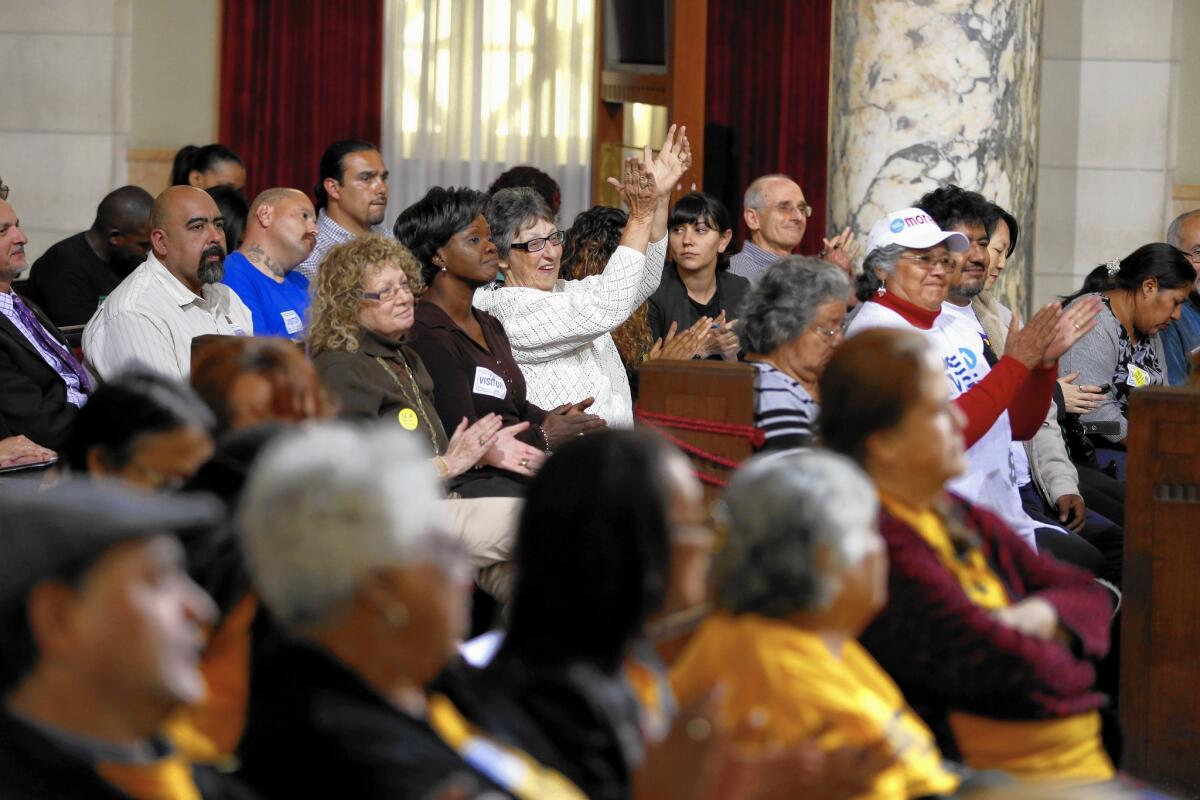Los Angeles minimum wage plan wins council panel’s backing: $15 by 2020

A key group of Los Angeles lawmakers on Wednesday endorsed a hotly contested plan to raise the citywide minimum wage to $15 by 2020, up from the current $9 an hour.
The City Council committee’s action was sharply criticized by business leaders as a job killer, yet deemed inadequate by some activists pushing to raise the rate more quickly.
------------
FOR THE RECORD:
Minimum wage: In the May 14 California section, an article about a Los Angeles City Council plan to raise the minimum wage said it would continue to increase automatically every year until July 2020, based on earlier increases in the consumer price index. In fact, it would increase that way starting in July 2022. —
------------
The proposal now heads to the entire council, which is expected to decide Tuesday whether to ask City Atty. Mike Feuer to draft an ordinance that would put a series of yearly increases into law. The decision marked a major stride toward boosting pay across Los Angeles, where city leaders have broadly agreed that some kind of increase is needed to lift workers out of poverty amid soaring rents and stagnant wages.
“This is perhaps the greatest shift of wealth in the history of this city,” said Councilman Gil Cedillo, who sits on the committee.
L.A. is following in the footsteps of cities such as Seattle and San Francisco. If approved, the plan would fall short of the across-the-board, faster increase to $15 that unions and their allies had initially pressed for.
“It’s not what workers in Los Angeles need,” said Laphonza Butler, a leader of the Raise the Wage Coalition and president of the Service Employees International Union California. “But it is a far cry from where we were.”
Labor activists and community groups had urged the city to reach a $15 minimum wage for all workers as soon as possible, arguing that low-income Angelenos are in desperate need. Martha Sanchez, a South Los Angeles resident who is unemployed, grew emotional as she described being hungry at school as a child, and now sharing her house with two other families to pay the mortgage.
“It seems that some of you are more sympathetic with the owners of restaurants, the big corporations, than their workers,” Sanchez told the committee.
Business owners and other critics told the committee that wage hikes would have catastrophic effects on local employers if the plan is not seriously reworked. Mark Echeverria, chief financial officer for the iconic Musso & Frank Grill in Hollywood, said his restaurant would face the elimination of 30% to 50% of its workforce if the minimum wage plan goes into effect without changes.
“These guys are my family,” he told the committee. “So I strongly, strongly ask the City Council, the committee and the city attorney’s office to look at other options.”
Stuart Waldman, president of the Valley Industry and Commerce Assn., argued that a $15 requirement would cost jobs whether it was phased in over five, six or seven years. Under the proposal, the citywide minimum wage for businesses with more than 25 employees would first increase in July 2016, when it would reach $10.50 per hour. After that, it would go up each year until 2020.
“It’s great that there are employees that are going to be making more,” Waldman said. “But there are a lot of employees that are going to be making nothing.”
For months, the debate between political leaders has not been whether to raise wages, but how high and when: In September, Mayor Eric Garcetti announced he wanted to ramp up wages to at least $13.25 by 2017. Several city lawmakers pushed to go further, increasing the hourly base wage to $15.25 by 2019.
Yet another plan offered last week suggested bringing the rate to $15.25 more gradually — by 2021 or 2022, depending on the size of the employer.
City officials also wrestled with whether to slow down the increases for small businesses or nonprofits that rely heavily on government grants, adjust the rules for workers who get tips, or cap any automatic increases that would be tied to inflation.
Under the plan approved Wednesday, the minimum wage would continue to increase automatically every year until July 2020, based on the average increase in the consumer price index over the previous two decades. Ruben Gonzalez of the Los Angeles Area Chamber of Commerce said automatic increases were like “a runaway train without anyone to steer it.”
Small businesses — those with 25 or fewer workers — would get an extra year to phase in the wage hikes, reaching the $15 mark by 2021. So would nonprofits of that size.
And nonprofits that help disadvantaged people transition into the workforce or get the bulk of their funding from government reimbursements, and do not pay their top executives eight times or more the wages of their lowest-paid workers, could ask permission to do the same.
However, the city requirements would not be adjusted in any way for workers who get tips. In a confidential memo sent to lawmakers this week, Feuer argued that under state law, it would be illegal to adopt a wage rule that does so. A coalition of local restaurants disagrees and has threatened to sue if the requirements fail to account for tips received by their workers.
Still, some activists pushing for a higher wage left City Hall disappointed, saying more-aggressive increases are needed for fast-food chains and other large employers.
“While this is a significant step,” said Elena Popp, executive director of the renters advocacy group Eviction Defense Network, “it is inadequate.”
Follow @LATimesEmily and @DavidZahniser for breaking news from L.A. City Hall.
More to Read
Start your day right
Sign up for Essential California for news, features and recommendations from the L.A. Times and beyond in your inbox six days a week.
You may occasionally receive promotional content from the Los Angeles Times.








